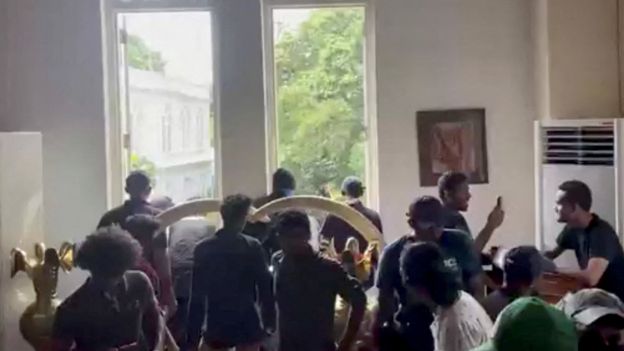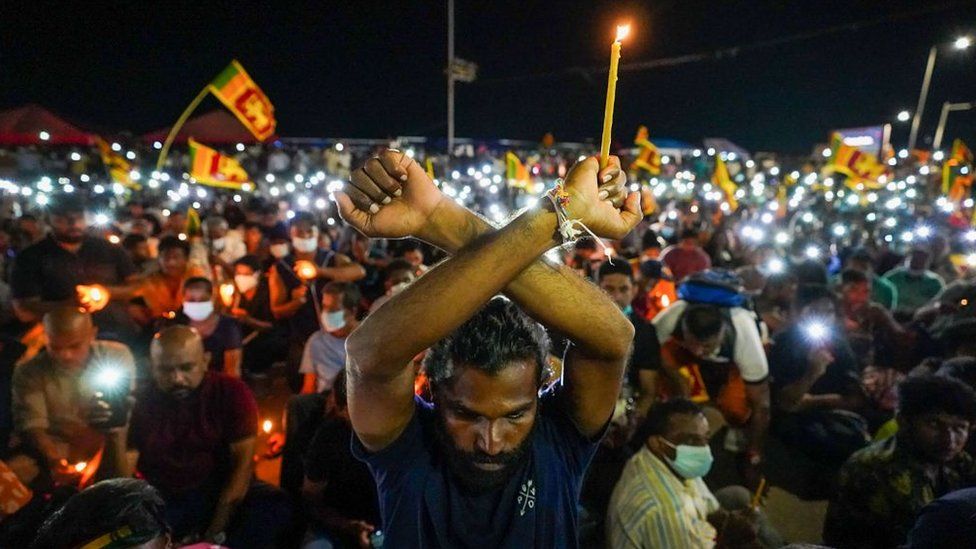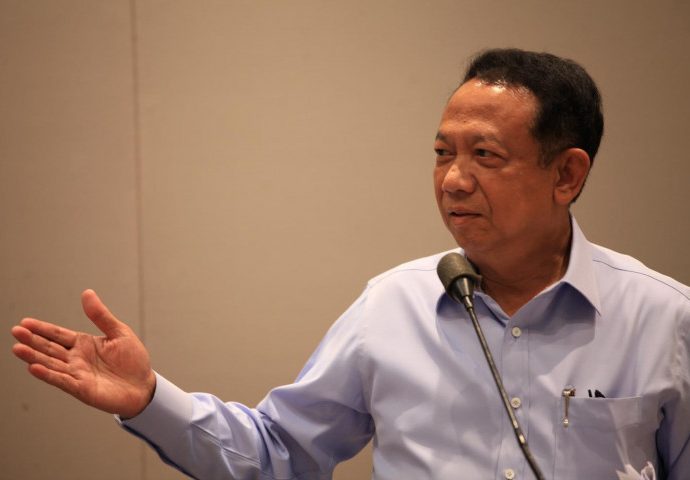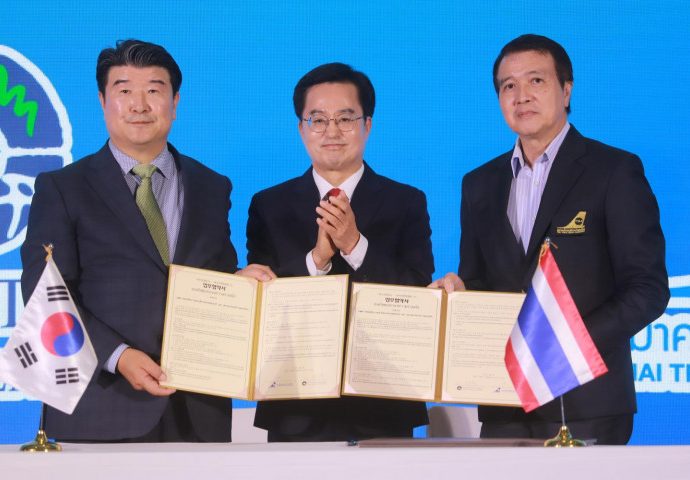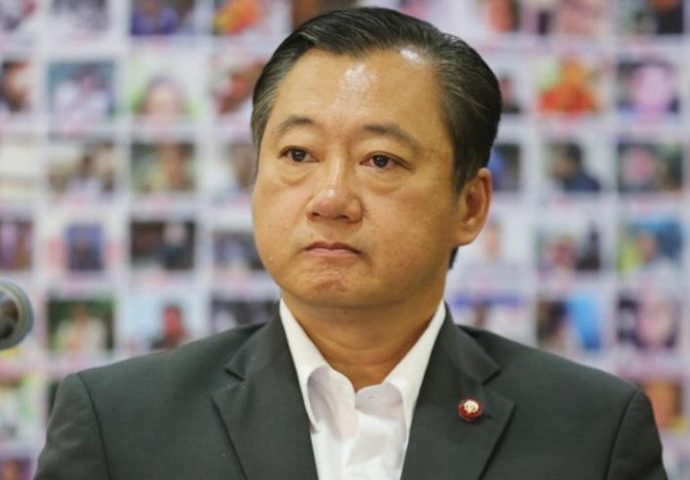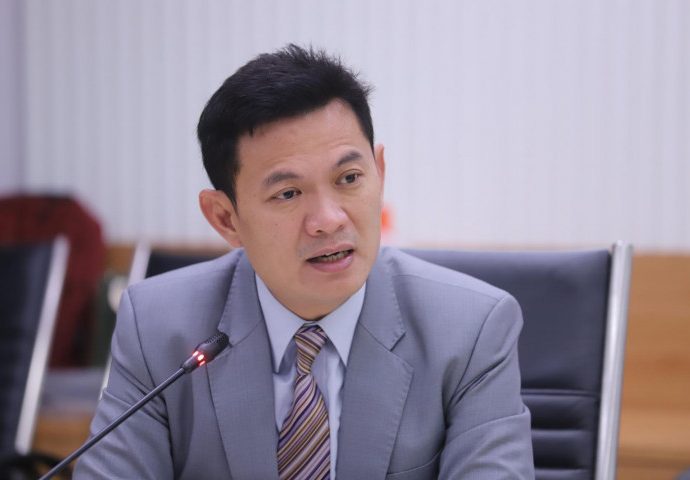Sri Lanka: The fate of a protest that toppled a president
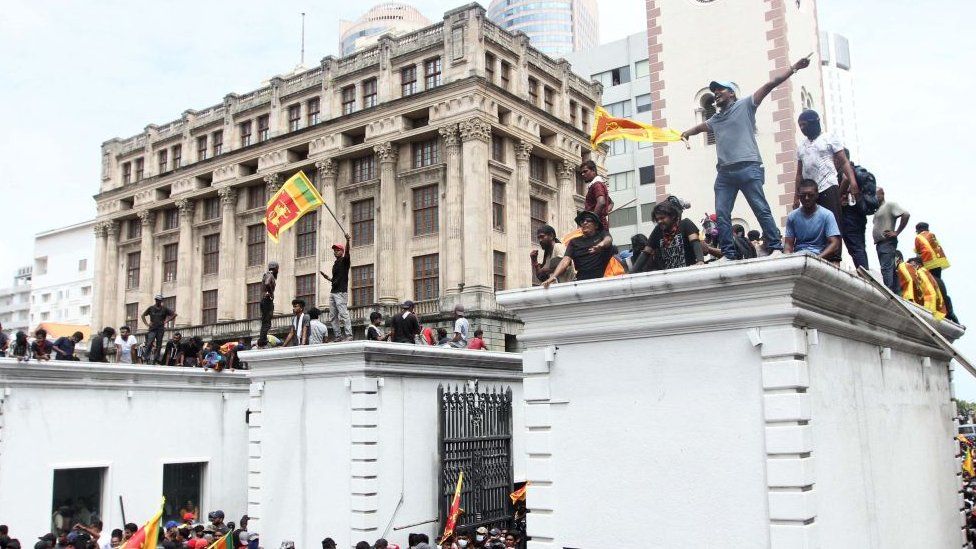 Getty Images
Getty ImagesUdeni Kaluthantri, a 54-year-old port worker, became an overnight sensation last year for reasons that had nothing to do with his job.
Days after protesters stormed the presidential palace in the Sri Lankan capital Colombo, a video surfaced of Mr Kaluthantri lounging on a bed draped with the presidential flag.
Pictures of young men jumping into the pool inside the palace and bouncing on the presidential four-poster bed had already gone around the world. Mr Kaluthantri’s video joined all of the other imagery as poetic proof of how millions of Sri Lankans were fed up of what they regarded as inept and corrupt governance under President Gotabaya Rajapaksa.
Soon after, Mr Rajapaksa fled the country, resigning days later. It was hailed as a massive win for an unprecedented people’s movement but one year later, Sri Lanka looks quite different.
The people’s struggle
In early 2022, inflation in Sri Lanka skyrocketed as foreign reserves emptied and the country ran short of fuel, food and medicine. Residents experienced up to 13-hour power cuts in what was the worst economic crisis the country had faced since independence.
Many held then president Mr Rajapaksa and his family responsible. While his disastrous economic policies led to the shortfall in foreign currency, the Rajapaksa family was also accused of corruption and siphoning public money. But the Rajapaksas deny any wrongdoing and place blame elsewhere for the crisis: the sharp drop in tourism revenue because of the pandemic and the high cost of fuel after Russia invaded Ukraine.
I was in Colombo last year as crowds gathered at Galle Face Green, a popular beach-facing public space in Colombo. The demonstrations continued day and night, the crowds swelling in the evenings with families, students, priests, nuns, clerics and monks. Driven by the rallying cry “Gota go home”, the protests engulfed the country, uniting Sri Lanka’s three major communities – Sinhalese, Tamils and Muslims – for the first time.
This video can not be played
To play this video you need to enable JavaScript in your browser.
Weeks later, they culminated in extraordinary scenes where protesters stormed the presidential palace, with the intention of forcing Mr Rajapaksa out of power. Mr Kaluthantri was among them. Mr Rajapaksa was not at the palace when the protesters broke in – so they made themselves at home, and took away all sorts of “souvenirs”, from bed sheets to books.
“I took the presidential flags away because I thought Mr Rajapaksa wouldn’t be able to act as president without those official symbols,” Mr Kaluthantri said. Sri Lanka’s presidential flags are unique to each president, and the design changes every time a new leader assumes office.
Five days later, Mr Rajapaksa fled the country and sent his resignation from Singapore. This was seen as a victory for the “aragalaya” or “people’s struggle” as the movement was called.
The decline of the Rajapaksa family would have been unthinkable a few months before. The politically powerful family was popular for crushing the Tamil Tiger separatists in May 2009 and ending the country’s 25-year civil war.
But now, a year on, it is the protesters who are in trouble, while the Rajapaksas and several other politicians singled out by public anger are back in the country – and in positions of power.
What happened?
The crackdown
After Mr Rajapaksa fled the country, veteran opposition politician, Ranil Wickremesinghe was elected as the new president in a parliamentary vote. He was backed by Mr Rajapaksa’s party, which had a landslide majority.
Hours after Mr Wickremesinghe was elected, the military was deployed to clear the crowds at Galle Face. Dozens of soldiers swooped on the site, dismantling tents and other belongings of the demonstrators.
Mr Kaluthantri himself surrendered to police and spent 21 days in custody on charges of desecrating the presidential flag. The case against him continues. “I have no regrets. I did it for the country and people,” says Mr Kaluthanthri, who was suspended from his job for two months.
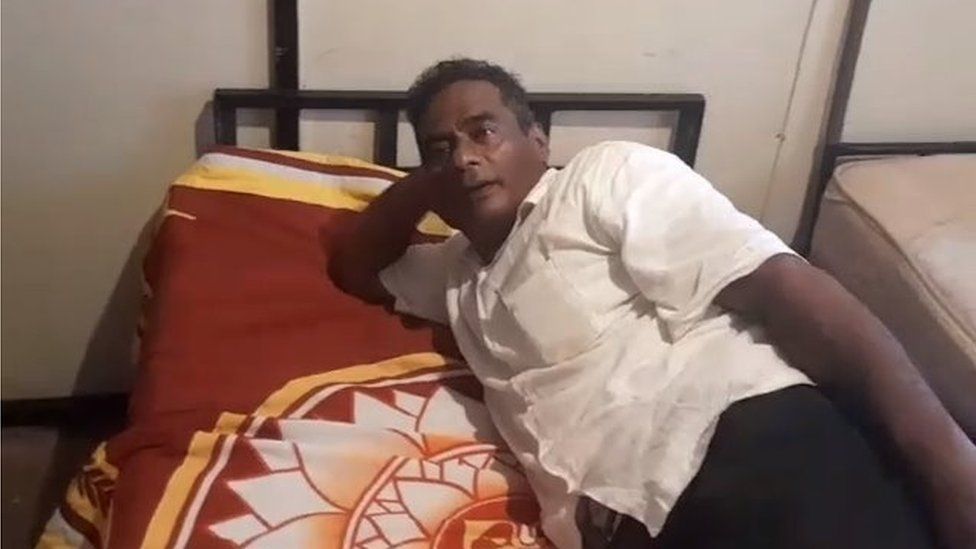
His only regret: “We managed to force Gotabaya Rajapaksa to resign, [but] we were not able to introduce a new political culture.”
With Mr Rajapaksa gone and the new government taking steps to ease the acute shortage of fuel and other essentials, many protesters resumed normal life. The authorities then used force – deploying all the legal and punitive powers at their disposal – to clear the last, most committed of the demonstrators from the protest sites.
Weeks later, Mr Rajapaksa and his brother Basil, who had also fled the country, returned.
The former president is now living in a high-end government bungalow, while many of the members in his cabinet have been reinstated.
The silenced voices
One of those who faced the full wrath of the state was Wasantha Mudalige, a left-wing activist and former convenor of the Inter-University Students Union. He was at the forefront of the protest movement.
Mr Mudalige was arrested under the draconian Prevention of Terrorism Act (PTA) and spent more than five months in prison.
“I could have spent more time in prison if not for the courts. The government cannot suppress protests without solving people’s issues.” Mr Mudalige says.
A court in Colombo dismissed the terror charges against Mr Mudalige in February and ordered his release. The judge said the authorities had misused the act.
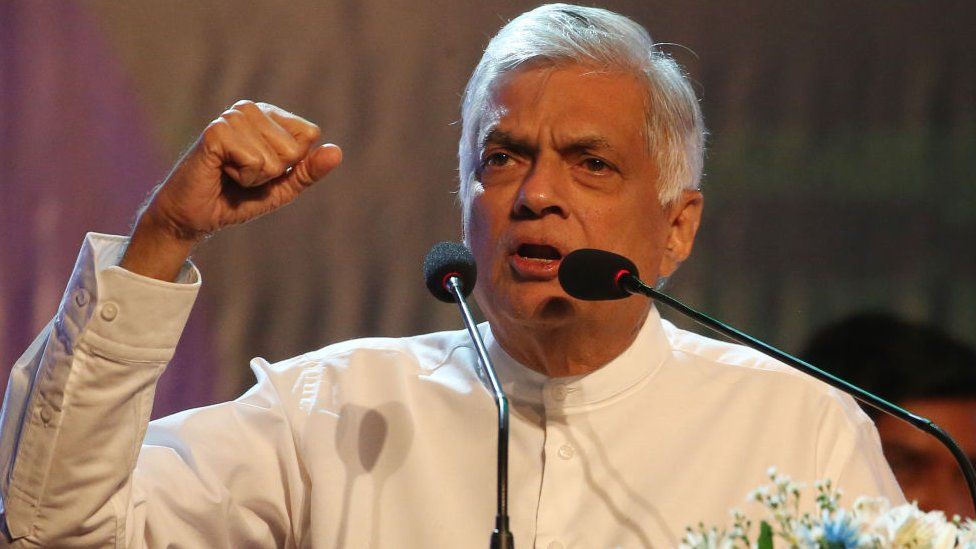
Many other protesters have also been charged under various laws, and some have been sentenced to prison. Yet many of the protest leaders look back at the movement with pride.
Swasthika Arulingam, a human rights lawyer and a prominent activist, says it was a historic, unorganised movement that attracted people from all walks of life.
“But we have not achieved the long term goals of Aragalaya – like… no change in the political system, no accountability on corruption, and those who are responsible for stealing people’s money are still in power,” she says.
Although the protests have gone silent for now, some protesters like Samadhi Brahmananayake argue that the agitation showed what people’s power can do.
“The protest gave us hope and confidence. We have realised what we can achieve collectively. Several young people now want to become politicians. We have to work towards political change,” says Ms Brahmananayake.
Mr Wickremesinghe’s government secured a $2.9bn dollar bailout from the International Monetary Fund in March. This has enabled Colombo to reach out to other international lenders to kickstart the economy, and find enough dollars to supply fuel, food and cooking gas.
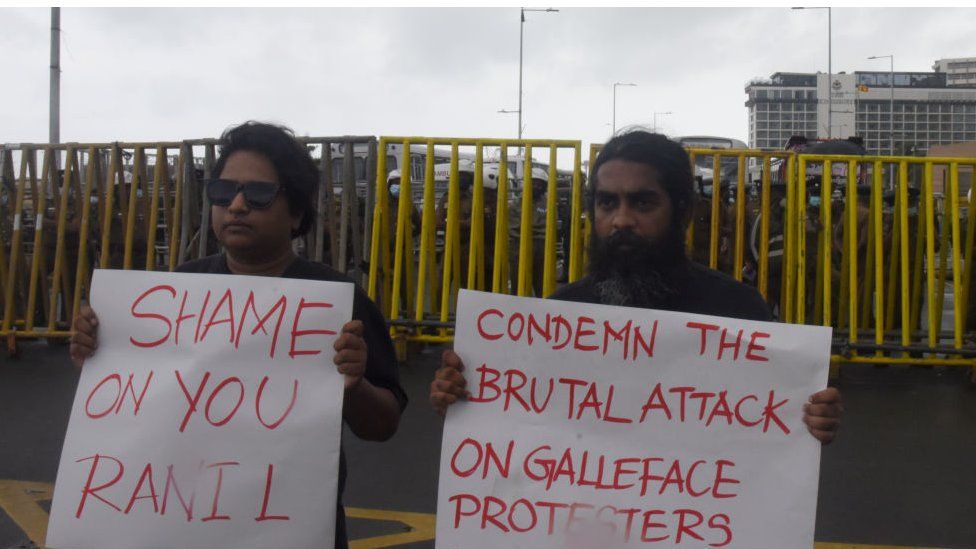
With tourism and remittances from Sri Lankan workers abroad picking up again, the country is clawing its way back but still has a mountain to climb.
Sri Lanka’s total debt, both domestic and foreign, stands around $80 billion and it will be a challenge to repay the loans. Colombo is negotiating with creditors to agree a debt restructuring programme by September.
The government is calling for a 30% write-off in investors’ capital in dollar-denominated bonds. But opposition leaders say this could have an impact on the pension funds of Sri Lankan workers.
The proposals have also sparked concerns among many Sri Lankans and some warn against taking the current calm for granted.
“The country continues to be in a state of economic crisis,” says Ms Arulingam. “In addition to the spiralling cost of living, now there are worries over retirement savings. If people’s living conditions do not improve, they may take to the streets again.”
You might also be interested in:
This video can not be played
To play this video you need to enable JavaScript in your browser.
-
-
9 July 2022
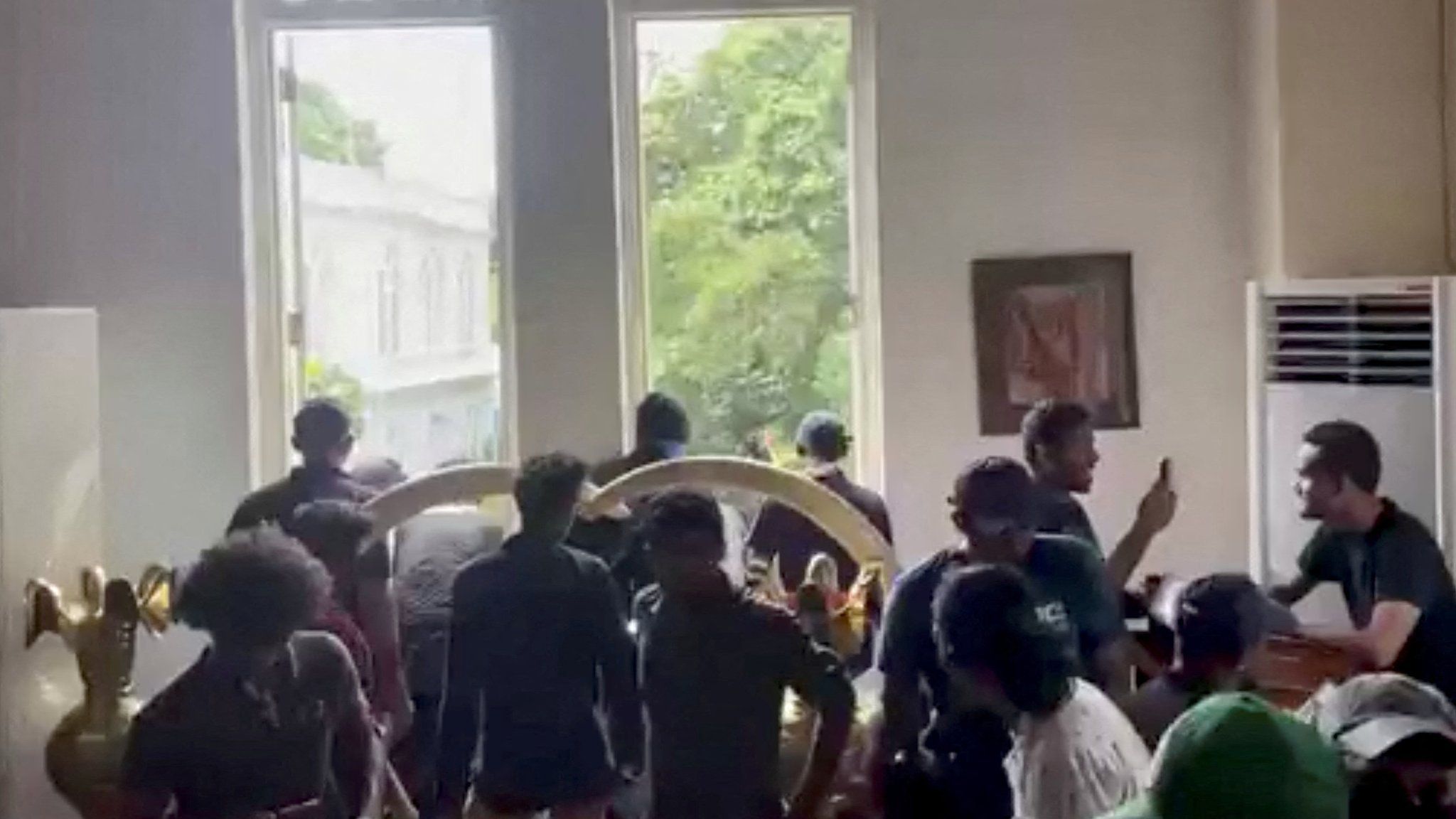
-
Commentary: Why are women expected to dress a certain way once they hit 50?
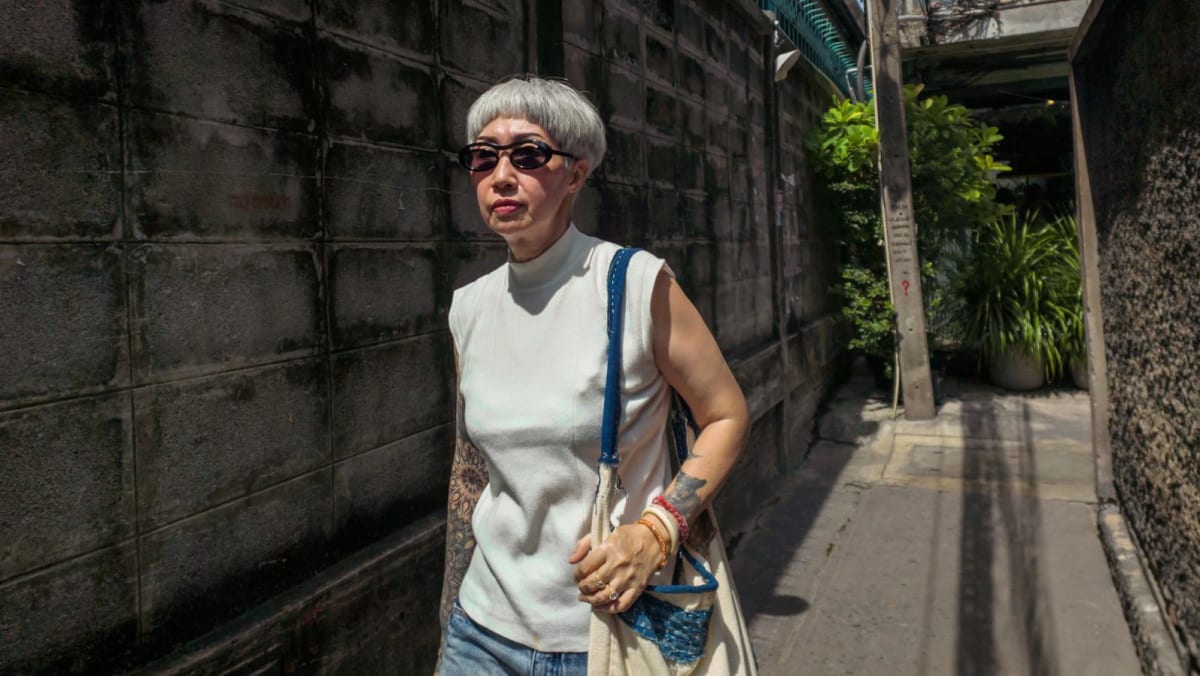
Yet she has her own personal, non-conformist style. She favours hats, chunky accessories, funky sneakers and vintage pieces. She has dyed her hair in all kinds of colours, from brown, blue and purple to platinum blonde.
As for me, I’ve decided that rather than follow fashion trends, I’m just going to dress according to my lifestyle. T-shirts and tank tops paired with shorts or tights for long walks, yoga, high-intensity interval training (HIIT) and staying home. Polo shirts and skorts for golf and running errands. Easy, breezy dresses for beach vacations, lunches with girlfriends and dinner parties.
No matter what anyone says, I still believe elasticated-waist jeggings are great for moving about. I will keep my shoulder-length hair the way it is – not because it makes me look younger, but because it’s more low-maintenance than a short crop.
And when those six ugly, gigantic bras break down, I’ll just get six more.
Tracy Lee is a freelance writer based in Singapore who writes about food, travel, fashion and beauty.
Tarit contests malfeasance suit
Ex-DSI chief says he was wrongly indicted for opposing 2010 red-shirt crackdown
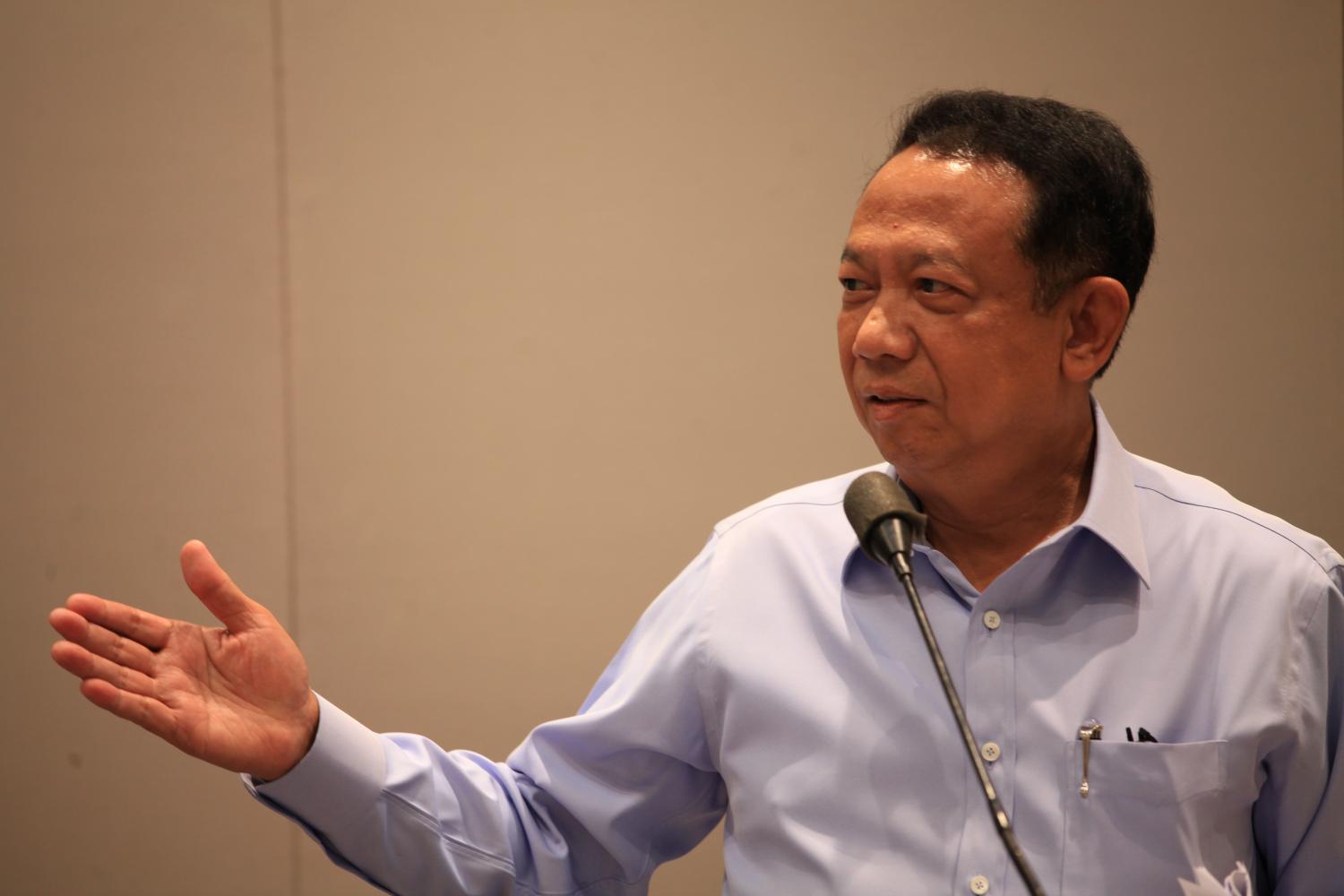
Former Department of Special Investigation (DSI) chief Tarit Pengdit has petitioned the Supreme Court to ask the Constitutional Court to rule on the constitutionality of Section 157 and Section 200 of the Criminal Code, under which he has been indicted for malfeasance.
The move comes ahead of the Supreme Court’s ruling tomorrow in a case connected with the political violence of 2010.
The malfeasance suit was brought against him by former prime minister Abhisit Vejjajiva and former deputy prime minister Suthep Thaugsuban who were in charge of the now-defunct Centre for Resolution of the Emergency Situation when handling anti-government protests in 2010.
The DSI under Mr Tarit brought murder charges against Mr Abhisit and Mr Suthep for ordering the crackdown on red-shirt protesters. After the two were later acquitted by the Supreme Court, they filed a malfeasance suit against Mr Tarit and others for unfairly pursuing the murder charges.
The Criminal Court dismissed the malfeasance case, but the Appeal Court then reversed the lower court’s ruling, sentencing Mr Tarit to two years in prison. The Supreme Court will hand down its ruling tomorrow after having postponed the ruling hearing eight times.
Appearing before the press yesterday, Mr Tarit said he is prepared to go to jail if he is found guilty, but pointed out that a malfeasance case like this one will discourage state officials from doing their jobs.
He said he petitioned the Supreme Court last week and urged the court to provide justice to the victims of the political violence as well as the state officials like himself who were doing their jobs.
The former DSI chief also urged the new government to set up an independent committee to look into the 2010 crackdown on red-shirt protesters.
He claimed that before the 2014 coup, he was summonsed to a military camp and told not to pursue the case or he would face a transfer if a coup was staged. He was transferred within 24 hours of the coup.
Ramet Rattanachaweng, acting Democrat spokesman, yesterday slammed Mr Tarit for twisting facts and undermining the justice system.
He said Mr Abhisit and Mr Suthep were already cleared of wrongdoing by the Supreme Court and the National Anti Corruption Commission (NACC).
He said Mr Tarit admitted to unlawfully pursuing the charges against Mr Abhisit and Mr Suthep.
“He should respect the legal process and fight the case in court. Don’t be embarrassed to face the truth or this matter will never come to an end,” he said.
S Korea’s Gyeonggi urges Thais to visit

The Thai Travel Agents Association (TTAA) and Gyeonggi Tourism Organisation (GTO) have signed a Memorandum of Understanding (MoU) to promote bilateral cooperation and initiatives on tourism.
Kim Dong Yeon, Gyeonggi governor, said Thailand had become the most likely destination for the “next” Korean Wave in Southeast Asia. With the expansion of airline routes, the province had sought to promote tourism between the countries.
He said the GTO realised the need to create awareness about the province among Thais, so organised the “Come to the real Korea, Gyeonggi” seminar on Friday in Bangkok to promote the region.
Gyeonggi is a province in the northwest of South Korea, surrounding the capital city of Seoul. It is the largest local autonomy area in South Korea and home to more than a quarter of the country’s population. Tourist highlights include the demilitarised zone (DMZ) in Paju City where both North and South Korean flags are flown at Bora Observatory Hall, he said.
The province is also popular for film shoots due its abundance of historical sites as well as Unesco World Heritage sites such as Hwaseong Fortress, constructed during the Joseon Dynasty and located in Suwon City, and the royal tombs of the Joseon Dynasty and Namhansanseong Fortress. The province is also a hub for semiconductor production and a home to world-renowned Korean businesses such as Samsung and Hyundai.
Govt eyes economic boost from health and wellness tourism

The government is promoting health tourism and related products and services in a new campaign to get overseas visitors to spend at least 18 million baht by this September.
The “Discover the New You!” campaign is backed by the Tourism Authority of Thailand (TAT) and more than 130 health and wellness business operators, including hotels, health resorts, spas, hospitals and clinics.
“The prime minister [Prayut Chan-o-cha] appreciates the cooperation from all sectors to promote health tourism and sustainable tourism,” government spokesman Anucha Burapachaisri told the media yesterday.
“The premier is also confident that this activity will draw the attention of tourists and add economic value,” he said.
The campaign is aligned with the Amazing Thailand Health and Wellness New Chapters New Experience project, which aims to sell products that appeal to tourists under the concept of “meaningful wellness”.
In addition, the TAT has invited business operators and social media influencers to join the campaign. But for now, related media networks will promote 15 health tourism routes.
The TAT said the aim is to capitalise on Thailand’s reputation for health and wellness products and stimulate the economy through tourist spending that the government is confident can top 18 million baht by September.
Those interested in the campaign can find out more information on the “discoverthenewyou.travel” website and the “@tat-wellness.th” official Line account.
Book by exiled academic banned for ‘insulting’ the King: Gazette

A book about the monarchy written by academic-in-exile Pavin Chatchavalpongpun has been banned in Thailand for defaming the monarchy, according to a police announcement published in the Royal Gazette on Friday.
The announcement said the cover and contents of Rama X: The Thai Monarchy under King Vajiralongkorn reflected attitudes that are insulting, defamatory and display great malice towards the king, the queen, the heir apparent or regent and threaten national security, peace, order and public morality.
The announcement was signed by Pol Gen Damrongsak Kittiprapas, the national police chief, on June 19, according to the Royal Gazette. It cited Section 10 of the Printing Recordation Act 2007 in banning the book.
Anyone who imports the book into Thailand is liable to a jail term of up to 3 years and/or a fine of up to 60,000 baht. The police chief has the authority to destroy the book, said the announcement, which takes effect immediately.
“My book has been banned despite the fact that nobody has read it,” Mr Pavin wrote on his Facebook page. “It will be on shelves in the United States in October and an e-book will also be available.”
Mr Pavin, 52, is a professor at Kyoto University and editor-in-chief of the Kyoto Review of Southeast Asia, published by the school’s Center for Southeast Asian Studies. He worked for the Ministry of Foreign Affairs for 13 years before becoming a political science academic. He has been an outspoken critic of the political establishment and pushed for reform of Section 112 of the Criminal Code, the lése-majesté law.
He moved to Japan in 2012 to take up his position at Kyoto University, but comments regularly on Thai affairs for international publications. After the 2014 military coup, he was ordered to report to authorities but refused.
The National Council for Peace and Order later issued an arrest warrant for Mr Pavin but he declined to return to Thailand and has been living abroad ever since.
MFP faces uncertain fate

The parliamentary vote to select the new prime minister is less than a week away and it is anybody’s guess who will emerge as the country’s next leader.
Under the charter, a candidate must receive at least 376 votes from among 500 MPs and 250 senators to become prime minister.
As things currently stand, the eight-party coalition led by the Move Forward Party (MFP) controls 312 House seats, so it needs the support of at least 64 votes from either senators or MPs outside the bloc to secure MFP leader Pita Limjaroenrat’s bid to become prime minister.
When the joint sitting of MPs and senators convenes this Thursday for the crucial vote, political observers don’t think the new prime minister will emerge in one round of voting. The coalition formation is likely to shift if Mr Pita cannot muster enough support to meet the 376-vote threshold after the second round.
In that event, observers present two possible scenarios: Pheu Thai, the second largest party in the eight-party bloc, may nominate Srettha Thavisin and a joint sitting of parliament may vote for Mr Srettha to be the next prime minister.
Or, Pheu Thai will take the lead in the coalition and bring in new partners or form a new one without the MFP.
In the latter scenario, either Mr Srettha or Gen Prawit Wongsuwon, leader of the Palang Pracharath Party (PPRP), may be voted in as prime minister, while the MFP may be forced into opposition.
Alliance to move forward
The selection of the House speaker and two deputies is a strong sign the formation of the eight-party coalition is on track, said MFP deputy party leader and list-MP Natthawut Buaprathum.
He said the bloc is also counting on MPs from outside the bloc and senators who indicate they will respect the majority’s wishes and so vote for Mr Pita to be prime minister.
Mr Natthawut said the number of senators expected to vote for Mr Pita is believed to exceed the number the MFP-led alliance needs and he expects the prime minister will be known in just one round of voting.
He said the party will prep Mr Pita for questions to be raised when he presents his vision speech before the joint sitting and if the party can address concerns, some may have a change of heart.
Many senators are against the MFP’s policies to amend the lese majeste law and may vote against Mr Pita or cast a vote of abstention.
“We believe several senators have decided to vote for him but keep the decision to themselves. The number of those in favour of Mr Pita is growing,” he said.
According to the MFP deputy party leader, at this point there is no situation in which the MFP would have to join the opposition and it will take a while before any legal cases against Mr Pita are finalised.
The MFP leader faces complaints questioning his eligibility over a shareholding in iTV Plc. The constitution bars individuals with media shareholdings from running for office.
Mr Natthawut also ruled out the possibility of some party MPs switching sides and dismissed speculation the party could be at a disadvantage because the House speaker is now in the hands of the Prachachat Party, known to be close to Pheu Thai.
He said the party’s fight for the House speaker post has nothing to do with the prime minister vote and the issue is settled now that Wan Muhamad Noor Matha, of the Prachachat Party, has assumed the role.
Regardless of who the House speaker is, the coalition is obliged to follow the memorandum of understanding on coalition formation which it signed, he said.
He said it is time for the country to have a government which can handle pressing matters including investors’ confidence and the budget bill for the 2024 fiscal year.
Asked if the MFP is ready to vote for a prime minister candidate from Pheu Thai, he said he believed every party has selected the best it can offer but it is too soon to consider them.
“We must support the MFP’s candidate first. But if we really have to pick someone else, we will consider candidates from within the alliance,” he said.
Two rounds ‘should be enough’
There is no limit as to how many times a prime minister vote can be held.
Mr Wan indicated that if a candidate fails to win a first round of voting, further rounds will be held until a candidate reaches the 376-vote threshold. A second round of voting is tentatively scheduled on July 19.
However, there are fears among the Pheu Thai Party that the deadlock can trigger the opposing bloc to nominate a challenger to Mr Pita in a bid to form a minority government.
According to a source in Pheu Thai, although the constitution does not put a limit on how many times parliament will meet to select the prime minister, there is no point in still nominating Mr Pita after two rounds.
There would be no problem if the Senate was not involved in the selection process, and without its support the eight-party alliance still needs MPs from outside the bloc, with Bhumjaithai currently on its radar, said the source.
But Bhumjaithai, which has 71 House seats, is against amending the lese majeste law and the party MPs abstained when the House voted to select the first deputy speaker candidate from the MFP.
The Chartthaipattana and Democrat parties may also be brought on board, but the alliance will have to wait and see how the Democrat leadership race turns out, according to the source.
“But above all, it should be agreed how many rounds of voting should be enough. If it drags on, the other bloc may nominate a challenger. And if they do, they may succeed,” said the source.
It is unlikely that Bhumjaithai will give Mr Pita votes without getting anything in return. In fact, party is expected to drive hard bargain, said the source.
If Mr Pita’s bid fails and Pheu Thai steps in to lead the coalition, the party will nominate Mr Srettha in parliament, the source said, ruling out the possibility of “an outsider” prime minister.
In case parliament fails to select a new premier from the candidate lists supplied by the parties, Section 272 allows half of the 750 MPs and senators to initiate a motion to suspend the rule requiring that PM candidates come from party lists.
Such a motion requires the support of two-thirds of all the lawmakers, or 500, to suspend the rule. A nominated outsider would also need at least 376 votes to become prime minister.
The source admitted that although the House speaker selection was quick and smooth, the prime minister vote could face hiccups. “There are concerns about renegade MPs,” the source said.
PM will emerge ‘from Pheu Thai’
Witthaya Kaewparadai, deputy leader of the United Thai Nation Part (UTN), said the MFP has put itself in a difficult position and if it cannot get itself out, Pheu Thai will take the lead in coalition formation.
He was referring to the MFP’s stance that it would not do business with those who supported Prime Minister Prayut Chan-o-cha in the 2019 general election.
The MFP and its partners will have to work things out with parties they brand “dictatorship” parties, he said, adding they know what the rules are, but still choose to put themselves on the spot.
However, Pheu Thai is considered to be in a better position than the MFP to clinch the PM post because it is opposed to revising the lese majeste law, said the UTN deputy leader.
“Whether or not there will be more parties added to the coalition depends on whether they reverse their stance [on not working with pro-military parties],” he said.
Asked about the UTN’s stance, he said the party made its stance clear when it put up MP for Phitsanulok, Padipat Suntiphada, for the first deputy House speaker post, challenging the MFP.
Sen Somchai Sawaengkarn said the MFP’s election victory caught the Pheu Thai Party off guard and posed a threat to the party which was banking on the two-ballot system to deliver it a landslide win.
In his view, Pheu Thai will negotiate to be part of the next coalition government and if an alternative is possible, the party may drop the MFP and join hands with Bhumjaithai or the PPRP.
“Pheu Thai’s goal is to be in the government and it’s willing to drop the prime minister post. It may even give the post to the PPRP but it’s not easy due to pressure from MFP supporters,” he said.
According to the senator, Pheu Thai will not nominate Paetongtarn “Ung Ing” Shinawatra, daughter of deposed prime minister Thaksin, this time to hold off critics.
Mr Somchai rejected speculation about the current government bloc forming a minority government because it would be short-lived and it would backfire when the next elections are held.
“A minority government is unnecessary and it’s not the way things should be. The parties that opt for this won’t survive the next polls,” Mr Somchai added.
Talks back aid fund for ex-workers

Implementation ‘may take years’
A tripartite working group, involving representatives of employees, employers, and the government, has reached a consensus on the need to create a contingency fund to guarantee financial compensation for laid-off employees.
This working group, formed in February and headed by the permanent secretary for Labour, Boonchob Suthamanuswong, has been studying the proposal extensively, the Bangkok Post has learned.
All parties were asked to offer their opinions and viewpoints. However, the employers’ representatives requested an implementation delay of two to three years before they are obligated to contribute regularly to the fund.
This delay request, according to Chao Khlaicharoen, speaking for the employees, makes it unlikely that the fund can be set up within the next couple of years.
Employer representatives cited the lasting financial burden of the Covid-19 pandemic as one reason to ask for a postponement of the contingency fund, Mr Chao said.
It also casts doubt on whether a new law or supplementary regulations would be needed for the fund’s execution.
The fund, despite its importance for protecting the rights of laid-off workers, has faced some opposition. Some employers’ representatives have expressed concerns about being forced to deposit large sums into the fund that they can’t withdraw, primarily to guarantee redundancy pay.
“To force employers to put a huge amount of money in an account that they aren’t allowed to withdraw from to ensure they will pay the compensation doesn’t seem like an ideal measure with which most employers will really agree,” said an employer representative.
Despite all sides agreeing the fund is needed to ensure the protection and rights of workers who are laid off and entitled to receive compensation under labour laws, no clear conclusion has been reached as to when this proposal will be implemented, said Ukrit Kanchanaket of the Employers’ Confederation of Thailand (ECOT).
He urged more discussions about the proposal, which at this point has been agreed on in principle.
Kanjana Poolkaew, deputy director of the Department of Labour Protection and Welfare, said more discussions will follow.
The number of employers flouting the labour protection law, passed in 1998 to protect laid-off workers following the 1997 Asian financial crisis or “Tom Yam Kung Crisis”, might not be high.
However, many workers suffer the consequences of this law violation, said Somphot Anchaya, a representative from the employee side.
The committee manages the existing fund which pays compensation to laid-off workers who have been unlawfully refused compensation by employers.
Some foreign investors have simply fled the country and avoided paying the compensation, while others claimed they didn’t have enough money to meet the payments, said Mr Somphot.
The existing fund is legally capable of only paying 70 times the daily pay rate of each laid-off worker — an amount far too low for helping laid-off workers whose employer refused to pay them in full, he said.
This issue is compounded by the fact that employers refusing to pay redundancy can still close their businesses and open new ones due to government policies supporting new businesses.
The contingency fund is needed to safeguard workers’ rights, he said.
MFP’s green spaces bill passes first reading

The Bangkok Metropolitan Council has passed the first reading of a Move Forward Party-backed bill increasing green space in the capital.
Putthipat Thanyathammanon, a councillor for Yannawa district from the MFP, said yesterday he proposed a motion to a council meeting on Thursday that the bill be put to a vote. It passed with 31 votes in favour against two abstentions.
The aim is to enforce a 50% open space requirement on new construction projects for growing trees or plants as trees and greenery will help absorb dust, improve air quality and lower city temperature, he said.
In the motion, all households must devote 50% of their available outdoor space for planting tress, so owners of a house with a 30m² outdoor area would be required reserve 15m² for planting trees and other approved greenery.
He said the motion will be applied to new and renovated building and housing projects. The measure excludes existing and old buildings.
He said the requirement will help to tackle the lack of green space in Bangkok, although the Bangkok Metropolitan Administration also has a budget to grow trees on road islands or using the pillars of skytrain projects for vertical gardens if necessary.
The World Health Organisation recommends a minimum of 9m² of green space per individual but in Bangkok, the area is only about 7m².
After passing the first reading, the council will have a 17-member committee deliberate the motion before submitting it to the council for second and third readings. “This bill is a proactive measure to help meet our basic right to health,” said Mr Putthipat.
Democrats prepare to put new pick in hot seat

A new Democrat leader should have a clean track record and a clear vision and be ready to work while in the opposition, said former Democrat Party leader Chuan Leekpai.
Speaking ahead of today’s selection of a new leader to replace Jurin Laksanawisit who resigned in a show of responsibility over the party’s poll defeat, Mr Chuan said it does not matter if the new leader is young but he or she should have a vision and integrity and be able to unify the party.
Mr Chuan said he has been with the party for more than 50 years and seen it go through ups and downs. Former Democrats like Warong Dechgitvigrom, Thaworn Senneam and Suthep Thuagsuban not only worked hard for the party but also had the national interest at heart.
“So I hope we get a leader with high potential who will work for the country, instead of someone who just wants to join the government or tries to do anything to be part of it.
“I don’t want to see that because the Democrat Party can work as either the government or the opposition. It doesn’t have to be in the government or it will lose its quality of being a political institution,” he said.
Mr Chuan declined to comment on criticism over the potential candidates vying for leadership.
Alongkorn Ponlaboot, current Democrat deputy leader, is the only MP to announce a bid to run for the party leadership.
Other potential candidates include Suchatvee Suwansawat, the Democrat Party’s Bangkok governor candidate; Watanya Bunnag, who heads the party’s working group on political innovations; and Det-it Khaothong, the Democrats’ acting secretary-general.
Former Democrat list-MP Chaiwat Traisunant yesterday backed former party leader Abhisit Vejjajiva’s return to the party’s helm, saying the ex-leader is best suited to lead the party.
Mr Abhisit, also a former prime minister, led the Democrats from March 2005 to March 2019. However, Mr Abhisit has not publicly expressed any interest in the post.
Mr Chaiwat also called on the new executive board not to join the coalition government because the Democrats have only 25 House seats which is not enough to drive the party’s policies and restore popularity.
If the Democrat party focuses its resources on performing a checks and balances role as the opposition, it may be able to restore public faith, Mr Chaiwat added.

